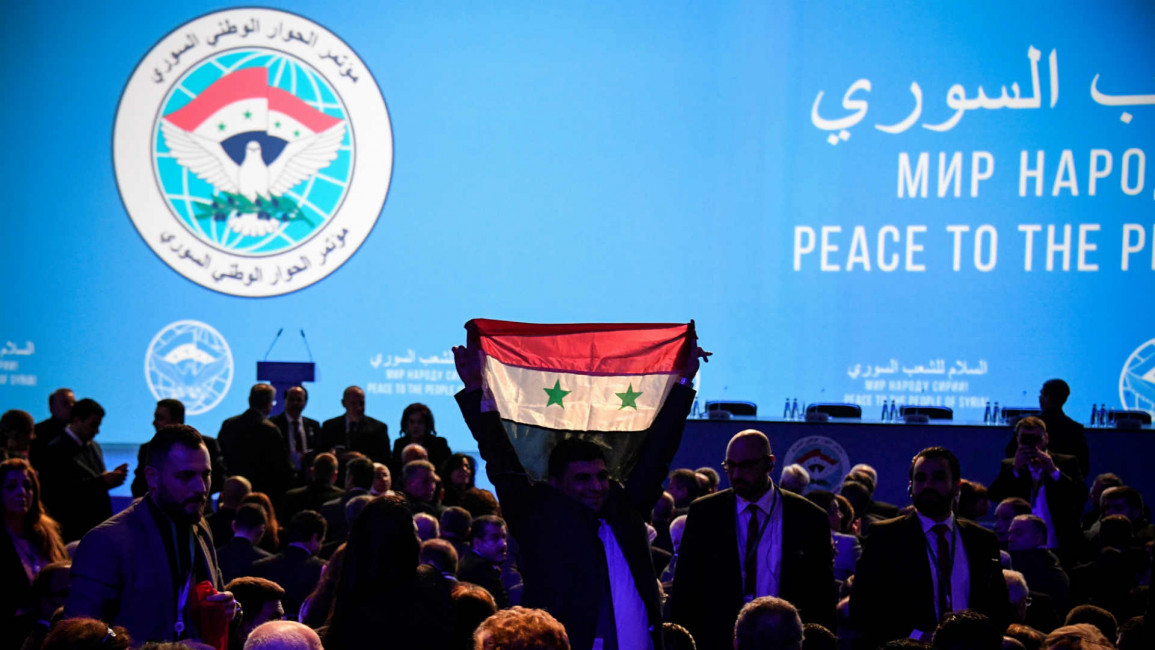Sochi's Syria peace talks fail miserably amid 'scandalous blunders'
Russia's showpiece Syria congress came to an end on Tuesday, amid widespread criticism that it was a "flop" and a "farce".
No significant breakthroughs were made in its somewhat gestural aims for peace, amid a string of "embarrassing" boycotts and last-minute cancellations from key Syrian factions, it was reported.
Around 1,400 delegates attended the meeting in the Black Sea resort of Sochi, as part of a broader push by Assad-backer Moscow to consolidate its influence in the Middle East and begin forming a political solution to the conflict.
But expectations for the event were dramatically lowered over the weekend after the main Syrian opposition group, the Syrian Negotiations Committee (SNC), and the country's Kurdish minority declared they would boycott the talks.
The conference suffered a further setback on Tuesday morning when rebel representatives, who had flown in from Turkey the previous night, made a U-turn at Sochi airport, due to the conference logo featuring only regime flags.
In closing remarks, UN Syria envoy Staffan de Mistura said delegates had agreed to the formation of a committee to discuss the country's post-war constitution, including government delegates and representatives of the SNC, among others.
He said the UN would lead efforts to form the committee, but did not specify how this would happen. A ninth round of UN-backed talks ended in Vienna last week without the warring sides having met face to face.
The final statement did not mention the fate of Moscow's ally President Bashar al-Assad, according to AFP.
A 'scandal'
The New Arab's sister publication al-Araby al-Jadeed blasted the talks as a "farce" and a "scandal", which would seem impossible to conceal, they said, apart from by cutting off the live broadcast, which the organisers actually did.
Twitter Post
|
The scandal, it claims, began when Russian authorities insulted Syrian opposition factions, who were attending on Turkey's request, by leaving them waiting for hours at Sochi airport, and deporting some of them who belonged to Syrian armed groups classed as "terrorist groups" by Russian factions.
The conference's use of Syrian regime flags for its logo, as well as the attendance of alleged war criminals such as Mihraç Ural, topped off the so-called scandal.
Ural, dubbed the "Banias Butcher", is thought to be responsible for the 2013 Banias massacre which left at least 62 people dead, including 14 children, in the Ras al-Nabeh district of the Banias governate, northwest Syria.
An 'embarrassment'
"We are going from theory to practice," de Mistura told reporters at UN headquarters by telephone from Sochi.
"We never had the government side and the opposition actually getting involved in a discussion of a new constitution, because they were not in agreement.
"I think we have reached that point."
Under the plan, the UN envoy will choose some 45 to 50 delegates who will be part of the committee from the government, the opposition and independent groups.
The SNC accused Assad and his Russian backers of continuing to rely on military might and showing no willingness to enter into honest negotiations as it announced it would not attend Sochi.
De Mistura, an Italian-Swedish diplomat who has led UN peace efforts in Syria since 2014, sounded a cautious note over whether the committee could take shape and achieve its goal of drafting a constitution.
"The devils are in the details. It's going to be uphill," he said.
Authorities from Syria's Kurdish autonomous region said at the weekend they would also boycott the event because of the ongoing offensive on the Kurdish enclave of Afrin by Turkey, which was co-sponsoring the Sochi congress along with Iran.
Twitter Post
|
Moscow's claims to fully represent Syrian society at the meeting - the first of its kind held in Russia - fell flat on their face, with virtually all those confirmed as attending being from either Assad's Baath Party, allied movements or the regime's "tolerated opposition."
The hosts did not provide a full list of delegates.
Neil Hauer, an independent analyst focused on Russia and Syria who was in Sochi for the congress, told AFP bringing the Kurds to their first major international Syria summit would have been one of Moscow's primary goals.
"They put a lot of political capital into this and negotiated for months, and it has been a flop," Hauer said, describing the no-shows at the talks as an "embarrassment".
Heckling
But Russian Foreign Minister Sergei Lavrov said he would "not make a tragedy" of the fact "two or three groups" could not take part.
Lavrov's opening remarks at the events, which were delayed by two hours because of ongoing negotiations, were interrupted both by cries of "Long live Russia!" and angry heckling from Syrian delegates.
Lavrov and his Turkish counterpart spoke twice on the phone in a bid to resolve the rebel issue, but after more than 14 hours of negotiations, the group returned to Turkey without coming to the congress.
Russia, which has spearheaded several rounds of talks from the start of last year in Kazakhstan's Astana, initially hoped to convene the congress in Sochi in November, but those efforts collapsed following disagreements among co-sponsors.
The conference's less-than-conclusive end happened the same day Russia carried out multiple airstrikes against marketplaces and a hospital in Syrian opposition-held Idlib province, killing dozens of civilians.
Moscow's decision to launch a bombing campaign to support Assad in September 2015 - Russia's first major military operation abroad since Soviet troops withdrew from Afghanistan in 1989 - is widely seen as a turning point in the multi-front conflict that helped shore up the Syrian president against the rebel opposition.
The Syrian war, in which more than 340,000 people have died and millions more been displaced, began in 2011 as the regime crushed anti-government protests.



